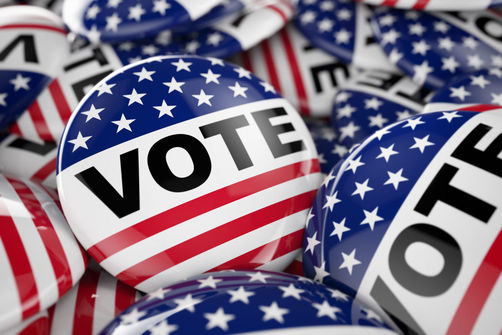 Throughout the Sunshine State, eager candidates are peppering rights-of-way with red, white and blue elections signs. They’re signs of the time as August 28 is Primary Election Day in Florida quickly approaches. Easterseals encourages members of the community to voice their support of causes and programs that help people with disabilities achieve independence and reach their potential. (Learn more on how to be an advocate for those with disabilities.) Below is a recent blog post by Beth Finke, Interactive Community Coordinator at Easterseals Headquarters, about how we can collectively work to bring issues that matter to people with disabilities into the spotlight. Where to we start? Beth knows. Read on… How Can We Bring Disability Issues to the Forefront of Elections? By Beth Finke With cyber concerns in the news these days, many polling places are considering returning to paper ballots in future elections. I get that, but here’s the thing: many people with disabilities cannot mark paper ballots without assistance. I’m one of those people. I am blind, and without being able to read a paper ballot, I rely on special voting machines equipped with earphones in order to vote privately and independently. But now, according to Michelle Bishop, a voting rights advocate for the National Disability Rights Network, the return to paper ballots in polling places could make poll workers less comfortable with operating machine-based systems. In a Stateline article, Bishop pointed out that with half of Americans voting using paper ballots now, untrained poll workers are discouraging the use of accessible voting machines at the polling places. From the article: “It’s a constant complaint from voters with disabilities nationwide,” Bishop said. In the last election, for example, a voter called her to report that a machine was placed in the corner, turned off, with a flower wreath hung on it. “The message is: You’re not wanted here,’” Bishop said. “We get reports of poll workers discouraging their use. They say, ‘I haven’t been well trained,’ ‘It’s intimidating to me,’ ‘We’ll set it to the side and get through Election Day.’’’ The article said an October study by the Government Accountability Office shows that nearly two-thirds of the 137 polling places inspected on Election Day 2016 had at least one impediment to people with disabilities. Among the infractions:
My polling place is right across the street from where I live. Others aren’t as fortunate. Many struggle to find transportation to polling places, and along with the lack of training for poll workers, limited access to registration materials and insufficient resources for election officials — well, it’s easy to understand why we can get discouraged. A survey of voters in the 2016 election by Rutgers University reported a decline in voter participation among people with disabilities. That, in turn, discourages political parties from targeting “get out the vote” efforts to people who have disabilities. “We’re segregating in the way we vote,” Bishop said in that Statesman article. “Separate is not equal. That’s a lesson this country should have already learned by now.” More than 35 million people with disabilities are eligible to vote in the U.S. That makes the potential for the disability community to bring disability issues to the forefront of elections (and to hold elected officials accountable for policies and decisions that affect people with disabilities) pretty high. But it all starts with getting more people with disabilities registered to vote.
1 Comment
1/24/2024 01:36:17 am
Kohl's is a well-known American store that was founded by Maxwell Kohl. They value their customers' feedback and provide a survey for this purpose. As part of the survey, Kohl's has announced exciting news for the winners. By participating in Kohl's official survey at https://www.kohlsfeedbackscom.com/survey-page/, customers have the opportunity to win a $2500 coupon. This is a great incentive for customers to provide their valuable feedback and potentially benefit from a significant discount on their next purchase at Kohl's.
Reply
Leave a Reply. |
Details
Archives
May 2024
Categories
All
|

 RSS Feed
RSS Feed